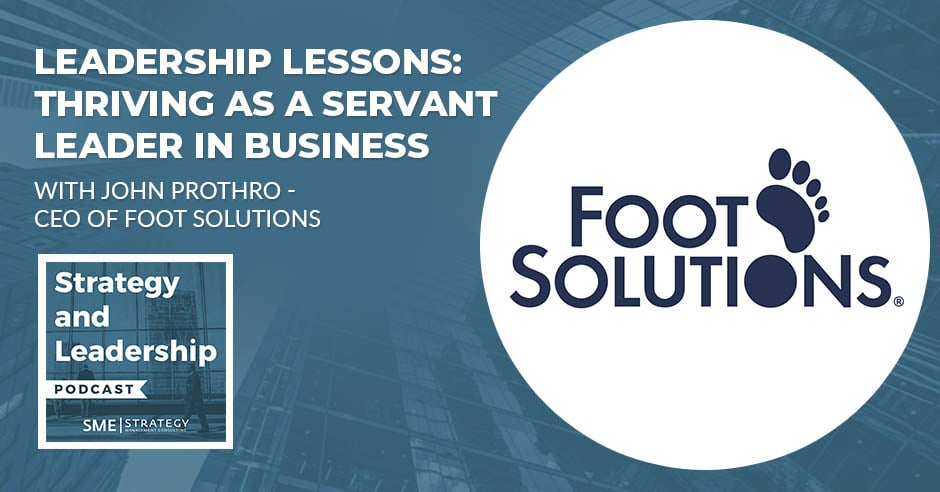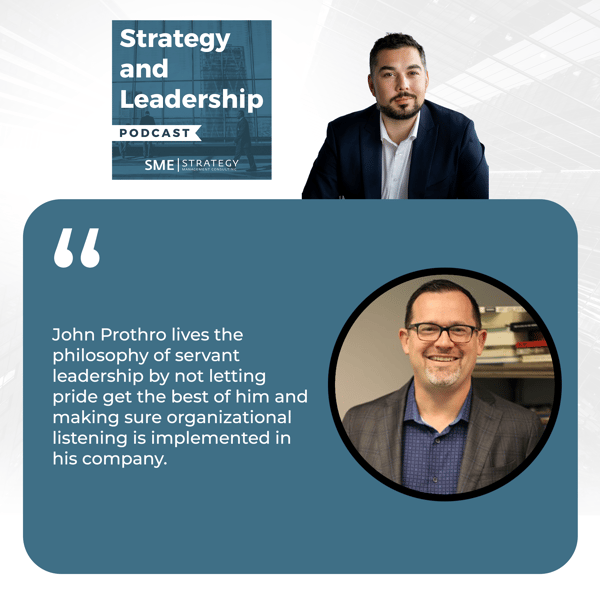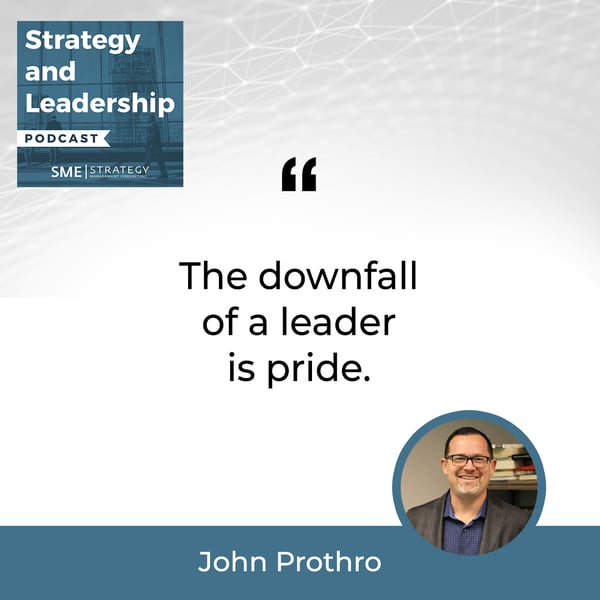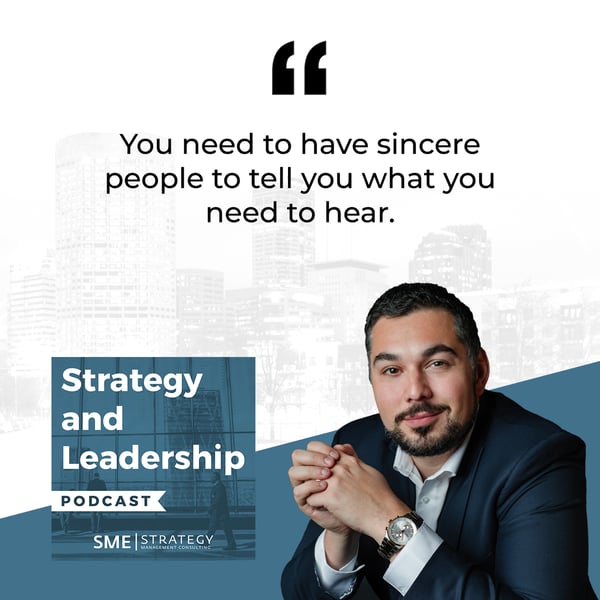
What makes a leader thrive in the business? In this episode, we will uncover some leadership lessons from the CEO of Foot Solutions to help us traverse into the space of entrepreneurship. John Prothro is a global foot wellness retailer bringing much value to this conversation. He shares his leadership approach, the core values of leaders, and how pride is the downfall of a leader. Mark also talks about organizational learning and so much more! So, what are you waiting for? Set foot into this valuable conversation, and we will take you on a whole new journey as a leader.
Listen on Spotify: https://open.spotify.com/episode/22016Hrf5Voq1BUwyDCBjJ?si=6e15d41e89254043
Listen on Apple Podcasts: https://podcasts.apple.com/ca/podcast/leadership-lessons-thriving-as-a-servant-leader-in/id1202449526?i=1000636638024
---
Watch the episode here
Listen to the podcast here
Leadership Lessons: Thriving As A Servant Leader In Business With John Prothro - CEO Of Foot Solutions
My guest is John Prothro who is the President and CEO at Foot Solutions. John, how's it going?
It's great. It's Friday, so we're almost there.
I had no idea it was Friday. I was like, “Oh.” I'm glad it's Friday where you're at. I have no idea what day it is here. That’s awesome. Since it's Friday, what has been the high point of your week so far, either professionally or personally?
My oldest daughter is playing in her championship volleyball tournament on Saturday. We've been back and forth to the gym and practicing. We're excited about it because we’re going to take state.
Good luck to her. Good luck to you. I'm sure it's going to be a big deal. I appreciate you making time to chat with me. I suppose everybody else is reading. We'll start off as we tend to start off. Tell me about you. Tell me about your background and how you became the President and CEO of Foot Solutions, and then I'll ask you some questions.

I have about a dozen years or so in mergers and acquisitions on the buy and sell side, some co-investing, as an intermediary for a while. I then got into business operations a couple of years ago on the executive side and industrial supply. It is a strange place to go, but it was one of our customers who asked me to join their team.
When I'd done that for a few years, I decided I'd like to raise a fund and buy some companies, a portfolio of companies, because we had some success on the buy side with some co-investment deals that we had done. In the middle of raising that fund, and it wasn't going to be a large thing, maybe lower middle market transactions, I got introduced to the Owner of Foot Solutions. Foot Solutions is a foot wellness retailer. It's an expert caring service that looks like a shoe store but does a lot more than that. We do truly custom orthotics that are done through laser scans, CAD/CAM designs, and 3D printing.
I met the Owner of Foot Solutions. The brand was a little bit stale at the time. It's a franchise brand. I fell in love with the concept. I loved the economics of the business and thought, “This is a great idea that needs to be executed.” I called my investors and said, “I’d like to do this. I'll install myself as the boss,” which is the best way to do it. I was like, “Let's grow it.” That was a few years ago.
We closed on it a week prior to the first COVID death in the US. You can imagine owning a franchised brand with retail stores that serve older folks. A lot of our customer base is folks who are starting to feel foot pain. We had to manage through that. We've done a decent job of managing the ups and downs. We're waiting for a normal period of time in the market, but we're doing okay regardless.
How many franchise locations do you have around the world?
There are about 80 locations globally. Eighteen of them are corporate-owned so the rest are franchised.
I'm in Vancouver, Canada. It's where I got my orthotics from. I am not exactly middle-aged. We won’t go there.
You're doing preventative medicine, right?
Absolutely. If memory serves, I was in Richmond in the UK and there's a Foot Solutions there.
There is. You're on top of things. We’ve 2 in the UK, 2 in England, and 8 in Ireland.
That's awesome. Check them out. It's not a plug. They're not sponsored. It's good for your body, your back, and all that stuff. I'll ask. Which do you prefer? Do you like being on the higher side of things, the transaction side of things, and the orchestrating side of things or do you prefer, in your experience, being on the operator side of things, the playing around, the tinkering, and getting into the weeds?
I like to get my hands dirty. I like to do big things. One of the reasons I made the switch from doing buy and sell side deals into operations was I was tired of telling people what they should do or what I thought they should do and being the guy who had to go and do it, which is a new ballgame. You realize quickly what you know and what you don't know. The more you know, the more you don't know if that makes sense. I made that switch and haven't looked back. I never was a high flyer anyway. I never showed up to a meeting with French cuffs on, but I like being on the operating side.
The more you know, the more you don’t know.
I call it mantra. What is your approach? What are your guiding principles for leadership? What are your guiding principles for business? What are some of the things that you're digging into Foot Solutions now and into the future that are going to support that future growth?
That’s five questions that are long answers.
We have time here. Why don't you pick one of them? How do you approach leadership generally speaking?
From a worldview perspective, I'm a Christian. I try to follow the principles that Jesus taught. There are a lot of folks who translate that into servant leadership business. Sometimes, that translates well. Sometimes, it doesn't. I have more focus on things having to do with trustworthiness and sincerity. It is having people around you who are very genuine, honest, and straightforward.
It is being able to be a decisionmaker who's the same way who may or may not make decisions that the staff likes or the person underneath you likes, but they know that you're listening and trusting in what they have to say. You're not prideful in your decision-making. You're doing it based on what you feel is right, not necessarily for some ulterior motive.
The downfall of a leader is pride. I've had my bouts with it. The downfall of a person, as a matter of fact, is pride. The minute you start saying you're your own God and you get to make your own decisions, the minute you think there's not something above you, then you're on your way down. That's probably more philosophical than you wanted to get.

It is what it is. My higher power is a little statue of a dragon ball character to humble me in my own way. There's something stronger than me. It's been helpful in my life and the things I've been working on. I'll ask maybe a slightly different question then. You jumped into this company a few years ago. You came in and made decisions based on trust, integrity, and what you thought was best. You told yourself, “I'm tired of telling people what to do, so I'm going to go do it.”
If you're willing to share or open to share, what were some of those quick wins? What were some of those things that you did right away as a new CEO of a business to get it on the track that you thought would be valuable? Hopefully, that helps our leaders if they're jumping into new organizations and wanting to make an impactful change.
The first thing I would say is defining the brand. Larger companies have figured out the brand-building side, building the brand book, and staying on message. Smaller companies haven't necessarily done that exercise because typically, it's pretty expensive, especially if you're using an agency to help you build out the brand, that brand book, and messaging. It's well worth the time, effort, and money to sit down with your team and the folks who know how to message something together and package together what you are as a business.
I talk about this a lot. If someone's tuned in to me on another show, they'll say, “This guy's repeating himself.” The brand itself, if you're defining your brand, that's one thing. They’re like, “We know who we are.” The best and next step you have to take is, “Why does that matter to our customer?” That's the step I don't think a lot of people take. They're like, “We do this.” That's great.
We sell truly customer orthotics. We have highly trained experts in the stores. That's great. Some customers might translate that into, “Those people can help me.” It would be much better if we said, “This is who we are and this is how it helps. If you think you might not be wearing the right shoes, you need to go to Foot Solutions because we can help you get out of pain.” The whole brand is solutions-oriented. That forces us to talk about what those solutions are that we're offering. The brand starting with who you are, how, and why that matters is a step back from digging in and going after it. You have to do that first.
Some people, when they hear the brand, they think of visual identity. What I hear is you went into the purpose of the organization of the company and then beyond the features, like, “What are the things we do? Why should anybody give a hoot? What's in it from them from their perspective?” It's easy for CEOs’ businesses to get so enamored with themselves. That goes back to the pride part. You're so prideful of yourself. You're forgetting about the servant nature of your work. You lose the plot. I don't know if you thought about it that way, but that's how I hear it.
It even goes deeper than that. It’s your core values. You start thinking, “We're going to list some pretty cool things that make us sound very ethical, strong, and moral,” but why does it matter? Why does it matter that one of our core values is sincerity? The staff that works with me here in the corporate office needs to know that that goes all the way down to them telling me what I don't want to hear. It goes all the way down to the interaction with the customer. Maybe that customer doesn't need a customer orthotic. Maybe they have nice arches and could deal with a $120 pair of insoles, and not accustomed. The core values along with the brand need to translate into actionable and the way you think about even the culture of the company.
I don't know how long Foot Solutions has been around. Did it over time start forgetting who it was or was it more of a need to refocus, realign, and refresh?
All companies go through a lifecycle, especially founder-led companies. This one had been around for twenty years. It had a lot of energy and ideas very early on. Founders inevitably start to slow down a bit. The owner had some health issues as well. It’s too easy to take your eye off the ball and let things start to get a little bit more chaotic than under control.
If you think about the investment lifecycle of a company, you either have an owner or a leader who wants to keep thinking about the future, or you have someone who's like, “My future is already set. If I make a decision that helps us 5 years down the road, I may not even be in this seat 5 years down the road. I might not be alive in five years. I’m collecting the cash I can now. I don't need to make any big investments in what we're doing.”
The 3D-printed orthotics were one of the best moves we made. Why was the old owner going to spend $1 million pulling in that technology, learning it, training, travel, and license agreements? He's not going to do that. Ten years down the road, he sees an amazing return on that investment. It’s a part of the lifecycle of the business.
That’s the longevity perspective if you're in it for being a 100-year business. We chatted with a guy from DuPont.
I tuned in to that.
That's awesome. You hear innovation, but they're trying to be around for 300 or 400 years. That's the difference between an owner-run company or founder-run company and an entity or organism that grows beyond itself. We’ll pause there. I do want to ask as we slowly wrap up. You mentioned one of the core values. The word escapes me. It led to the fact that people can tell you stuff you might not want to hear.
As you are going through the business, what were some of those humbling lessons? What are some of the things that you found out the hard way? What are some leadership lessons that you're like, “This is a good one but it stings a little bit?” Do you have 1 or 2 of those, not necessarily Foot Solutions related but you've learned in your career as a leader?
Yeah. With that one, sincerity is the word you're looking for.
Thank you.
One of the hard truths I had to learn and hear from somebody was I don't manage upwards very well. I don't know if you've ever heard that terminology. That goes back to the pride thing. I tend to run as fast as I can and then turn around to see who's with me rather than getting buy-in, not just from the folks who have to do what you want to do and have to run and keep up but also from the people who are above you or who you're reporting to.
I have been known to not be weak in the area of talking to the folks above me as if their opinion matters more than mine does. In reality, it does. I've had some issues with that. I don't want to turn this into a psychology session, but there are plenty of things I could point to that I've learned from people who will say, “You're messing this up. That was a miss. You need to fix that.” If people are not saying that to me, then I'm starting to think about letting them go because I can't stand yes people.
I hear the importance of humbleness and being able to recognize what it takes to have a successful team. You need to have the people below you, and then depending on certain cases, the people above you. Both of those groups of people need to be sincere and tell you not what you want to hear but what you need to hear.

I don't want to say pander, but if you take it easy on people, it doesn't help them. You're helping them less by trying to spare their feelings. Don’t be mean. If in the true spirit of supporting and being a servant leader wherever you are leading, whether you are leading up or down, serving people sometimes means delivering uncomfortable truths so that they're actionable and can do something about it. You can improve. Otherwise, you have resentment.
I'm a big believer in organizational learning. I don't know if you've read anything on that or studied that at all. It's a very simple concept, which is you've got a lot of brains in the room. You’re like, “Let's use them. Let's listen to what folks have to say, incorporate that, and make sure there's an environment where people will speak up if they see something that's not working or see a way to improve things.”

My buyer who sits right outside my office, I heard him talking about our shipping costs, which he doesn't involve himself through the operations. The VP involves herself in that. He was like, “We could save money if we did this.” She's listening. I’m like, “That makes sense.” There is that collaboration and that culture of listening to each other, bouncing ideas off each other, and being receptive and sincere. You can quantify that in a lot of ways because you end up making more money and end up having better company because of it.
That sounds like you're building the right culture and the right team. Things are moving forward, so that's very exciting. As we finish up, what's next for you personally as a leader? What are you taking on and then what's next for Foot Solutions that you're very excited about? We'll then finish up.
We spent about three years building the foundation and the scale at the corporate level. We made several acquisitions. We've gotten this business to a point where we can sell franchises. We've been doing that again starting this 2023. We have lots of new franchisees in the pipeline and new ones that have already signed up. We are excited about that because it's taking the business to the next level.
On top of that, I mentioned I like to do big hard things. We’ve done all the backend systems and changes we needed to do. We’ve done all the integration that we need. It’s not all of it, but we're in the process of doing everything that we need to do to have that foundational structure to grow the company rapidly and smartly
When you're growing very quickly, especially when you're making acquisitions, you're breaking things. Things are falling apart. People are quitting. You're running into things you didn't do diligence and you wish you had. We feel good about where we sit in terms of the team is right. The systems are right. We've got a nice model that works from an economics perspective. A lot of people want to jump on board as franchisees. I'm excited to see what happens. The economy is amazing. We’ll probably still struggle through a lot of economic headwinds, but what we've got is something special and I'll see where it goes.
What’s then for yourself personally?
We've got four kids. I'm not having any more kids. I'm here to stay. Somebody asked me on a podcast one time, “What would you tell young folks who are very ambitious?” I said, “You need to move.” For the most part, if you want to take those major steps forward in your career, you have to be willing to pick up stakes and move. This is the longest period of time we've ever lived in one place. We're building a house that's almost done. We have a community. We've got friends, church, and the whole thing. I’m happy about not going anywhere for a while.
If you want to take those major steps forward in your career, you should be willing to pick up stakes and move right now.
Progress is sometimes standing still. I love that. That’s awesome. Where can people connect with you? If they want to learn more about your franchise system, where can they do that? Where can they connect and say, “What's up?”
Unless you're an IT or software salesperson, you're welcome to find me on LinkedIn and connect. If you are one of those things, I love you and appreciate you, but please don't hit me up. If you want to learn more about Foot Solutions, it's FootSolutions.com. It’s very simple. If you want to learn about franchising, go all the way to the bottom. There is a small link. Click on that. Otherwise, visit your local Foot Solutions that can help you if you’ve got foot pain or that sort of thing. Support those franchisees. They're out there working hard to take care of the community.
Thanks for having a chat. Thanks for your transparency, candor, and willingness to be who you are. That was a really fun conversation. I wish you nothing but the best wherever you are, especially if it's where you are now.
Thank you.
---
My guest is John Prothro who is the President and CEO at Foot Solutions. One of the things I took away from this interview is the ability to lead successfully and the ability to reflect on one's business to say, “Are we clear about what we're doing for people?” It is then reflecting on oneself to say, “Am I doing the things that I need to be doing to be a servant leader, a supporter, or a great leader, in general, and a human being and team member at the same time?” Thank you again for being here. This has been the show. If you haven't yet, please subscribe and drop a rating if you like it. I appreciate you tuning in. I appreciate you being here. I'll see you next time.
Important Links
- Foot Solutions
- LinkedIn – John Prothro
About John Prothro
 John Prothro is CEO of Foot Solutions, a global foot wellness retailer. He is an experienced executive with a background in M&A, operations, and multinational business leadership, and he has lived and worked in both China and the United States. John holds degrees from Texas A&M and Vanderbilt University where he was a baseball player.
John Prothro is CEO of Foot Solutions, a global foot wellness retailer. He is an experienced executive with a background in M&A, operations, and multinational business leadership, and he has lived and worked in both China and the United States. John holds degrees from Texas A&M and Vanderbilt University where he was a baseball player.


